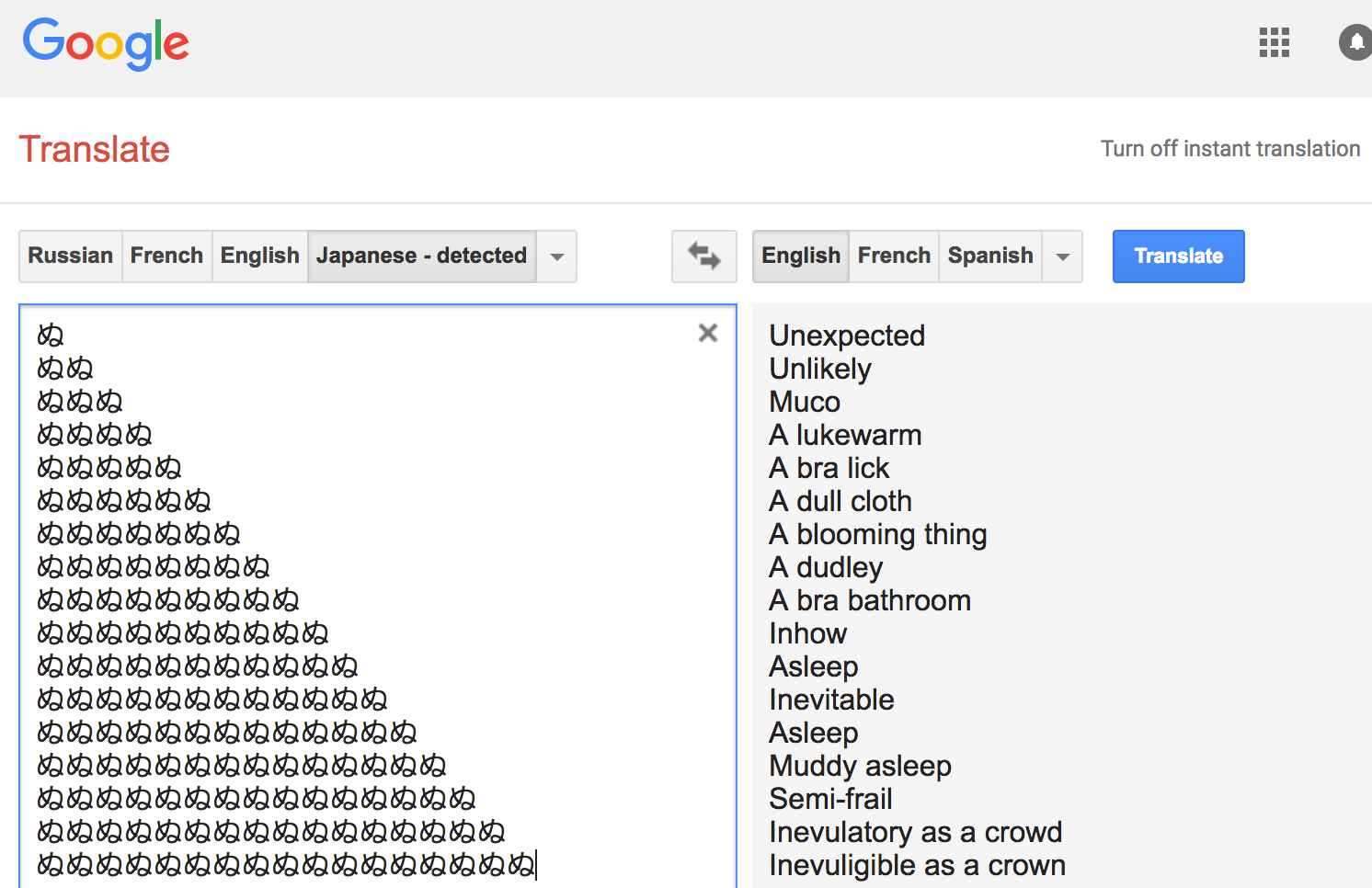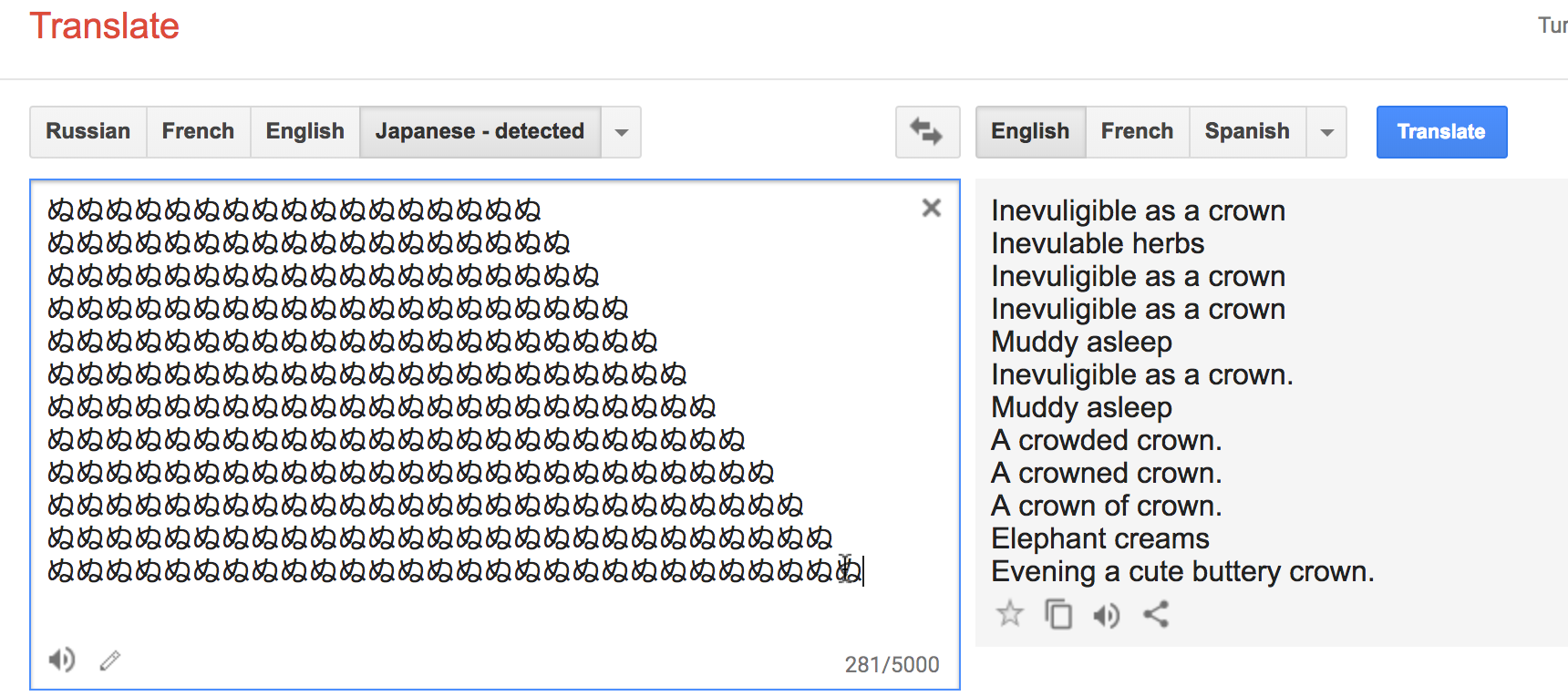Easy going crazy
« previous post | next post »
Today Josh Tenenbaum gave a talk here in the Interdisciplinary Mind and Brain Seminar Series, under the title "On what you can’t learn from (merely) all the data in the world, and what else is needed". One of his themes was that current RNN systems lack common sense, and so in honor of that point, here's another episode in our ongoing Elephant Semifics series. This one is based on repetitions of ぬ 0x306C "HIRAGANA LETTER NU", which Google Translate correctly diagnoses as Japanese.
[link]

[link]

[link]
And so on — but "Easy going crazy. Easy going crazy." seems like the right place to stop.


SM said,
February 16, 2018 @ 3:03 pm
I was hoping he would show one of these type of examples.
Jerry Friedman said,
February 16, 2018 @ 3:13 pm
I shall add "inevuligible" to my vocabulary at once. What does it mean?
[(myl) The OED knows it not. "Evuligible" isn't there either.]
Belial Issimo said,
February 16, 2018 @ 4:16 pm
It derives from vuliō, vulīre, vulīvī "to tangle" (cf. Eng. "wool") and means "unable to be untangled."
ktschwarz said,
February 16, 2018 @ 4:41 pm
I've been waiting eagerly for the next "Elephant semifics" post, because I have a new question that I've never seen asked here: Is it possible to get hallucinatory translations starting from English? The answer is yes, but not easily. A string of repetitions of one syllable, like the above, doesn't produce anything interesting. I managed to get something by starting with a real English sentence and randomly knocking out consonants until Google Translate lost its grip. For example, if I tell it this is English:
and tell it to translate into French, I get this perfectly grammatical output, which even uses a subjunctive correctly:
while if I tell it to translate into German, I get a totally different hallucination:
And so on. Some languages work and some don't; that is, some produce a grammatical sentence in the target and some just spit back the nonsense input. This leads to another important question: What language pairs are most robust to hallucinations? Possibly English-Spanish: I've never found any interesting hallucinations there.
[(myl) Amazing. And for your first input, Google Translate suggests translating it from Hawaiian rather than from English. This produces the French output:
Il est important que vous puissiez trouver une personne qui est membre de la communauté et que vous puissiez voir votre emon et vos amis ainsi que le vôtre.
And the English output:
It is important that you be able to find a person who is a member of the community and you can see your emon and your friends as well as your own.
Disturbingly, if we change the last word of the input to "aeiou", we get the input
Onuing omay a ely ost i cona o un e istri puli osial il ta o fo u o wo emon a e hoita oad ee a ew anage opay o ake oe, boa eer eie aeiou./p>
And the output:
Si vous voulez savoir que vous êtes un animal et que vous pouvez voir votre démon et votre père et que vous êtes pressé, vous serez mieux lotis.
I feel that this line of inquiry is becoming dangerous… ]
Chris C. said,
February 16, 2018 @ 5:46 pm
I think we've hit on a new procedure for eventually generating a Shakespeare play. Which is fine by me, since monkeys are unsanitary and typewriters are archaic.
David Marjanović said,
February 16, 2018 @ 5:48 pm
MU
m said,
February 16, 2018 @ 7:27 pm
Being a little clueless, I googled "semific" — the first citations are mostly to LL but then it goes south a little. Forgive me — I hope no one else has already posted this use of the word: "Yet in studying corpses too intimately, vision becomes clouded, imagination takes over, as if, in fine, only a semific- tional shaping of the morbid were able to conjure up the terrible effects of the proximity of dead bodies, the dreaded putrefaction, that powerlessness before pain, those memories that escape. Madame Necker"
Rubrick said,
February 16, 2018 @ 7:51 pm
You had me at bra lick.
Ed M said,
February 16, 2018 @ 9:09 pm
If one continues with Translate a few stages beyond "Easy going crazy. Easy going crazy", the sequence shown above repeats preceded by "This is the perfect place to relax." So:
"This is the perfect place to relax. Unexpected"
"This is the perfect place to relax. Unlikely"
and so on. When that sequence is finished we get:
"This is the perfect place to relax."
"This is the perfect place to relax. Unexpected"
"This is the perfect place to relax. Unlikely"
and on, and then expand again …
[(myl) And along the way we get 43 nus rendered as "It is an ancient ruin of ancient Egyptian citrus fruit.", and then "It is an ancient ruin of ancient Egyptian cinnamon.", and "It is an ancient ruin of an ancient cemetery. It is located in the south-east of Shenzhen.", and then with one more nu we get "It is a cheerful budget boutique hotel, which is located in the south-east of Budapest.", and then "It is a boutique hotel that is known for its bamboo baskets,", and then finally "This is the perfect place to relax." In one of the bamboo baskets, no doubt.]
anya said,
February 17, 2018 @ 12:56 am
I began typing "evuligo" by analogy with "eligo" into Wiktionary search, and Wiktionary suggested evulgo 'publish', e- + vulgo as in vulgus, from which 'vulgar'. The OED has 'evulgate':
Obs. or arch.
trans. To send out among the people, make commonly known or public; to divulge; to circulate, publish (a book).
Could 'evulatory' be 'evolatory', characterized by flying out (evolo).
maidhc said,
February 17, 2018 @ 12:59 am
This is eerily reminiscent of Jean Cocteau’s 1950 film Orphée, in which Orphée transcribes enigmatic lines of poetry that he hears on his car radio, which, unknown to him, are being broadcast by his dead rival Cégeste.
Jupiter rend sage ceux qu'il veut perdre… Je repète: Jupiter rend sage ceux qu'il veux perdre… deux fois…
Jonathan Smith said,
February 17, 2018 @ 1:16 am
Inspired by ktschwartz and nu, I tried some English "word parts" to Chinese:
ing ing ing ing ing ing ing ing ing ing ing ing ing ing ing ing ing ing ing ing ing ing ing ing ing ing ing ing ing ing ing ing ing >> 本發明的目的是提供一種有效的促進劑,這種促進劑有效地改善了有機酸的存在 (the aim of the present invention is to supply an effective accelerant, this kind of accelerant effectively ameliorated the presence of organic acids)
ppen ppen ppen ppen ppen ppen ppen ppen ppen >> 如果您有任何問題,請與我們聯繫 (if you have any questions, please contact us)
raught raught raught raught raught raught >> 盡最大的努力來表達最重要的理想 (expend the greatest effort so as to express the most important ideals)
raught raught raught raught raught raught raught >> 最應該抱著痛苦的力量來表達最強烈的痛苦 (most of all one should carry painful power so as to express the most intense pain)
etc.
ktschwarz said,
February 17, 2018 @ 3:47 am
@myl, anything with a low proportion of consonants and no diacritics tends to get detected as Hawaiian. I can get it to detect "English" by adding in a few more consonants and a couple of "the", and still get hallucinatory translations into French, German, Danish, … that are completely different semantically from each other. Note that the "Hawaiian">French and "Hawaiian">English translations had the same meaning: that's because when you asked for Hawaiian>French it actually did Hawaiian>English>French, as you can check by plugging in the English as input. You can easily confirm using English homonyms that English is the intermediary in almost any translation pair; Russian-Belarusian is the only exception I know of.
@Jonathan Smith, excellent idea! My goal was to be absolutely sure the input had no meaning, and your method is even better. It looks like you've fished out a big undigested lump of corpus with that first one—probably straight out of a patent.
How about Tenenbaum's seminar? What does he mean by "Chomsky and Gleitman and Pinker were right after all"? I thought Chomsky's statistical argument was disproved, i.e. "Furiously sleep green ideas colorless" is statistically much less probable than "Colorless green ideas sleep furiously", but all I know is what Mark Liberman wrote here.
Ed M said,
February 17, 2018 @ 5:21 am
I didn't report the sequence correctly. What I should have typed was that after the sequence
"This is the perfect place to relax. Unexpected"
"This is the perfect place to relax. Unlikely"
The sequence is repeated an the token prefixing the strings ("This is the perfect place to relax.") is doubled.
"This is the perfect place to relax."
"This is the perfect place to relax. This is the perfect place to relax. Unexpected"
"This is the perfect place to relax. This is the perfect place to relax. Unlikely"
And then for the next sequence it is tripled, and so on.
anya said,
February 17, 2018 @ 6:45 am
maidhc: aren't we the culture an unsupervised ML system too, with – as long as the poetic is the 'new' that engages the processing apparatus we value – a generator duking it out with (learning from the rewards/penalties given out by) an adversarial classifier into what is banal (spam) and the rest? Good spam, the kind that gets to us past the filters, is as beautiful as surrealism is when fresh… Here's the paper that hypnotized me into believing this: https://arxiv.org/pdf/1706.07068.pdf (Elgammal e.a., 2017). Spam and rogue MT is prettier than this art, but good spam has likely had more time and money put into it.
Jerry Friedman said,
February 17, 2018 @ 9:51 am
Belial Issimo: Excellent! I did check whether vuliō was in Lewis and Short.
Prof. Liberman: Thanks. Google doesn't know it either, except for references to your experiment.
han_meng said,
February 19, 2018 @ 10:38 am
I couldn't figure out why I was getting something different, but it turns out the following is what you get if you put a space between the ぬ's:
Unexpected
Unlikely
Inu
Inui
Welcome home
Let 's go through it.
Temple of the Temple
Temple of the Immortal
You are my friend.
You are my friend.
You are my friend.
I'm sorry but I can not help it.
I'm sorry but I can not help it.
I have no idea what to do.
I do not mind living in a cloud
I'm sorry to bother you
Thunder Invisible Stuff
I do not care. I do not care.
I do not care. I do not care.
Shihchuan said,
February 20, 2018 @ 8:07 am
Just out of curiosity, I tried it with ふ (fu), and the breaking point is 20: up to 20 repetitions, GT (correctly) translates it as a string of laughter in the form "hehehuhuhuhu", but starting from 21 it starts saying that "It's a 5-minute walk from the center of Hua Hin.", and then from the center of other places……
Once I started adding は (ha) after the 20 ふ, GT yet again (correctly) interprets it as a string of diabolic laughter (occasionally with a somewhat ominous insertion of "Heisei" at the beginning as repetition increases), but when I reach 20 ふ and 39 は, it gives me this out of the blue:
"Hehuhuhuhuhuhuhahahahahahahahahahahahahahahahahahahahahahahahahahahahahahahahahahahahahahahahahahahahah What are you doing to yourself?"
I'll freely admit that I was somewhat startled: it's now starting to feel like an allegory to Icarus or the Towel of Babel……